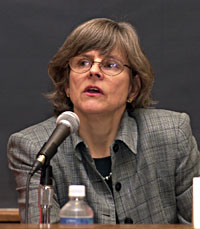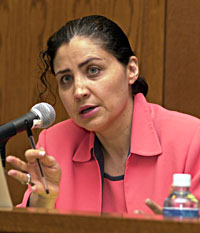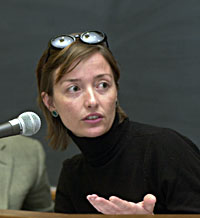
Julie Preston
Rossana Fuentes
Consuelo Saavedra |
effect on Latin America
How Latin American nations are faring in a world of increasing globalization was the topic of discussion among three journalists covering the region who visited the campus as Poynter Fellows in Journalism.
Their April 18 visit marked the first time that Yale honored international journalists as Poynter Fellows, reflecting an "increasing commitment to global affairs and to Latin America," according to Gilbert Joseph, the Farnam Professor of History and chair of the Council on Latin American and Iberian Studies, who moderated the discussion.
The three journalists -- Rossana Fuentes of Foreign Affairs en Español, Julie Preston '76 of The New York Times and Consuelo Saavedra of the Chilean news magazine Siete+7 -- individually addressed a series of questions posed in advance by Joseph and then briefly discussed with each other and audience members issues facing Latin American countries as they continue their emergence in the global-scale market economy.
Tumultuous political and economic events in Argentina and Venezuela; a growing sense of dissatisfaction with neoliberalism and its attendant free markets and democratic principles; corruption in government; a rise in crime, violence and unemployment in Latin America; and the weakening of political parties and institutions in the region were among the topics the journalists covered.
Preston, an editor at The New York Times foreign desk, spoke about the prospects for democracy in Latin American nations, noting that "economic mismanagement is bedeviling and threatening democracies across the region." While the new world economy creates growth, she noted, it also has the effect of "upending traditional societies" and "socially and economically polarizing newly open market countries." Such is the case in Mexico, where the northern part of the country near the American border is "making economic progress" while the people in the southern part of the country are getting poorer, said Preston.
A primary issue for Latin American countries is balancing growth with income distribution and instituting sound financial management, Preston told the audience. Recent turmoil in Venezuela, where the country's president was ousted from power in a military coup and restored to his position two days later, can be attributed in part to economic failure, particularly "the historic failure of the pale-faced political elite" to share its wealth from oil with the poor mestizo Venezuelans, who make up 80% of the country's population, The New York Times journalist said.
Similarly, Argentina's debt crisis can be blamed on the fact that the nation "tried to be half neoliberal, which works about as well as being half pregnant," Preston said.
She added that weeding out corruption is another critical issue for Latin American countries, saying that corruption in a free market economy not only inhibits economic growth but also "discredits democracy in the eyes of the poor."
Fuentes, who is managing editor of Foreign Affairs en Español, described the current period as "a spring of discontent in Latin America." She said that in Argentina, Venezuela and Mexico, there is "a growing dissatisfaction with what democracy has brought to the table," citing as its root the widening gap between the better-off and the poor. While she echoed Preston's description of the "acute" gap in income distribution between northern and southern Mexico, she said "there is poverty all over Mexico" and few employment opportunities anywhere in the country. In fact, she claimed, for all the political, social and economic change in her native country, there has actually been very little economic growth there in the past two decades.
Another critical problem in Mexico, Fuentes said, is the country's "lack of rule of law." She cited a study which showed that 95% of street crimes go unpunished there, which she said is a reflection of how "ungovernable civil society has become."
"We're seeing mind-boggling numbers of impunity," Fuentes said, noting, "You have to face the fact that if something happens to you, there is no chance you can get retribution."
On a more positive note, Fuentes said, there is much less discontent in her country than there is in Argentina and Venezuela, where large numbers of people have demonstrated against their governments. In addition, she claimed, the country has made some strides in that "we're seeing more working democracy processes in most Mexican institutions, some of which were known for their secretive and undemocratic ways." For example, for the first time, the Catholic Church is now "questioning some fundamental issues" and is also openly discussing the issue of sexual abuse in the church, she told the audience.
Saavedra, the U.S. correspondent for the Chilean news magazine Siete+7 and host of a daily current events radio program for the radio station Duna, claimed that some of the problems facing Latin American nations can be attributed to a lack of U.S. involvement in the region and a failure of American foreign policy.
In regards to free trade, Saavedra criticized what she described as American "hypocrisy" on the issue. She cited various U.S. trade protections against Latin American goods and complained, "the U.S. preaches free trade abroad but does not always practice it at home."
Furthermore, she said, the United States has failed to keep a promise made by President Bush to make Latin America a foreign policy priority of his administration. Despite "tremendous human suffering" in Argentina as a result of the country's severe financial woes, she explained, the United States has not offered financial assistance to help bring about economic restructuring in the country it once "praised as a model of reform." Likewise, the Bush administration remained silent during the recent military coup against Venezuelan president Hugo Chavez, Saavedra stated.
"Granted, Chavez has done much to divide his country but it didn't justify his being removed by force," she told her audience, adding, "What was the lesson of the Venezuelan coup? To would-be conspirators, it would be that if you try to depose a government the U.S. government doesn't like, the United States may look the other way."
On that issue, she continued, "the United States failed the test."
All three of the journalists conceded that even the positive economic, social and political transformations that have taken place in Latin American countries come with a certain price. Fuentes commented on that process in the region, saying, "Although there is a lot of dissatisfaction with the very idea of democracy, it would be a mistake to assume it doesn't work."
-- By Susan Gonzalez
T H I S
Bulletin Home
 W E E K ' S
W E E K ' S S T O R I E S
S T O R I E S![]()
 Emerging leaders from 18 nations coming to Yale as first World Fellows
Emerging leaders from 18 nations coming to Yale as first World Fellows
![]()
![]()
 World Fellows diverse in nationality and experience
World Fellows diverse in nationality and experience![]()
![]()
 Alumnus' gift funds visiting chair in economics
Alumnus' gift funds visiting chair in economics
![]()
![]()
 Yale opens center for student groups
Yale opens center for student groups![]()
![]()
 Wanted: Your views about the YB&C
Wanted: Your views about the YB&C![]()
![]()
 Journalists decry globalization's effect on Latin America
Journalists decry globalization's effect on Latin America![]()
![]()
 HUD Secretary hails spirit of volunteerism in the U.S.
HUD Secretary hails spirit of volunteerism in the U.S.![]()
![]()
 Streets is reappointed as chaplain and is named acting master of Trumbull College
Streets is reappointed as chaplain and is named acting master of Trumbull College![]()
![]()
 ALUMNI NEWS
ALUMNI NEWS Free speech bazaar will highlight AYA assembly
Free speech bazaar will highlight AYA assembly
![]()
 Alumni to be honored for their service to the University
Alumni to be honored for their service to the University
![]()
 Students to work with community service groups via AYA Summer Fellowships
Students to work with community service groups via AYA Summer Fellowships
![]()
![]()
 Research on genes upholds Darwin's theories, says Moore
Research on genes upholds Darwin's theories, says Moore![]()
![]()
 With the eye of an engineer, scientist tackles problems of medicine
With the eye of an engineer, scientist tackles problems of medicine![]()
![]()
 Exhibit explores transformations in American life
Exhibit explores transformations in American life![]()
![]()
 Communiversity Day 2002
Communiversity Day 2002![]()
![]()
 Nobel laureate to present Farr Lecture at event showcasing student research
Nobel laureate to present Farr Lecture at event showcasing student research![]()
![]()
 SCHOOL OF NURSING NEWS
SCHOOL OF NURSING NEWS Permanent exhibit and renamed room honor . . . Arnstein
Permanent exhibit and renamed room honor . . . Arnstein
![]()
 Family nurse practitioner is lauded for her care
Family nurse practitioner is lauded for her care
![]()
 Nursing students will trek a Vermont mountain trail to raise funds . . .
Nursing students will trek a Vermont mountain trail to raise funds . . .
![]()
 Dr. Pruett is honored for his dedication to mental health services for children
Dr. Pruett is honored for his dedication to mental health services for children
![]()
![]()
 In this year's 'showdown,' robots will demolish and build
In this year's 'showdown,' robots will demolish and build![]()
![]()
 Divinity School partners with Lutheran seminaries
Divinity School partners with Lutheran seminaries![]()
![]()
 Threats to nation's computer systems to be examined
Threats to nation's computer systems to be examined![]()
![]()
 Conference to explore relationship between 'apocalypse and violence'
Conference to explore relationship between 'apocalypse and violence'![]()
![]()
 Texas Rangers are subject of historian's talk
Texas Rangers are subject of historian's talk![]()
![]()
 Juniors honored for their college spirit, contributions and talent
Juniors honored for their college spirit, contributions and talent![]()
![]()
 Ten scientists win NARSAD research grants
Ten scientists win NARSAD research grants![]()
![]()
 Edwin D. Mullen, long-time manager of purchasing, dies
Edwin D. Mullen, long-time manager of purchasing, dies![]()
![]()
 Center marks retirement of noted child psychologist
Center marks retirement of noted child psychologist![]()
![]()
 Student musicians will perform works by Brahms in two May concerts
Student musicians will perform works by Brahms in two May concerts![]()
![]()
 May Day concert to feature program of German music
May Day concert to feature program of German music![]()
![]()
 Celebrating Earth Day
Celebrating Earth Day![]()
 |
| Visiting on Campus
Visiting on Campus |
| Calendar of Events
Calendar of Events |
| In the News
In the News |
| Bulletin Board
Bulletin Board![]()
Yale Scoreboard |
| Classified Ads
Classified Ads |
| Search Archives
Search Archives |
| Deadlines
Deadlines![]()
Bulletin Staff |
| Public Affairs Home
Public Affairs Home |
| News Releases
News Releases |
| E-Mail Us
E-Mail Us |
| Yale Home Page
Yale Home Page

